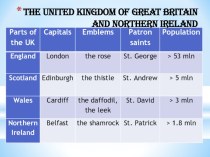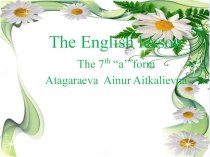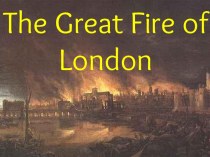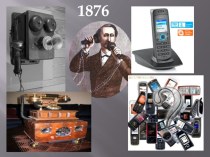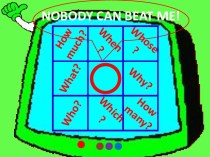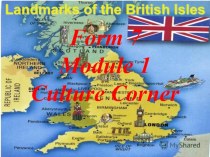- Главная
- Разное
- Бизнес и предпринимательство
- Образование
- Развлечения
- Государство
- Спорт
- Графика
- Культурология
- Еда и кулинария
- Лингвистика
- Религиоведение
- Черчение
- Физкультура
- ИЗО
- Психология
- Социология
- Английский язык
- Астрономия
- Алгебра
- Биология
- География
- Геометрия
- Детские презентации
- Информатика
- История
- Литература
- Маркетинг
- Математика
- Медицина
- Менеджмент
- Музыка
- МХК
- Немецкий язык
- ОБЖ
- Обществознание
- Окружающий мир
- Педагогика
- Русский язык
- Технология
- Физика
- Философия
- Химия
- Шаблоны, картинки для презентаций
- Экология
- Экономика
- Юриспруденция
Что такое findslide.org?
FindSlide.org - это сайт презентаций, докладов, шаблонов в формате PowerPoint.
Обратная связь
Email: Нажмите что бы посмотреть
Презентация на тему по теме Anglo-Saxons к курсу страноведение
Содержание
- 2. . Historians call them Anglo-Saxons. The new
- 6. It was during the second half of
- 7. How long did the Saxons stay in
- 8. Counties The Saxons settled in areas of
- 9. Invasion and settlement
- 10. Anglo-Saxon Society• Warrior-based society, led by strong
- 11. Anglo Saxon HousesWe know what Saxons houses
- 13. Anglo-Saxon life Where did the Anglo-Saxons settle?When
- 14. Kings and laws One king or
- 16. Anglo-Saxons at war How Anglo-Saxons foughtAnglo-Saxon
- 17. Alfred the Great Why was Alfred
- 18. King Alfred the Great against the Danes8th–9th
- 22. Stories and pastimes Story-tellingAnglo-Saxons liked to gather
- 23. The Anglo-Saxon bards• called “scops” Anglo-Saxon harp
- 24. Growing up GirlsAnglo-Saxons thought sons and
- 25. Anglo-Saxon beliefsEarly Anglo-Saxon beliefsIn Roman Britain, many
- 26. Where do the names of the days
- 27. What happened to them?English and VikingsThe English
- 28. Why is Sutton Hoo famous? Much of what
- 31. The Spread of ChristianityAround A.D. 400 Christian
- 32. Скачать презентацию
- 33. Похожие презентации
. Historians call them Anglo-Saxons. The new settlers were a mixture of people from north Germany, Denmark and northern Holland. Most were Saxons, Angles and Jutes. If we use the modern names for the countries they































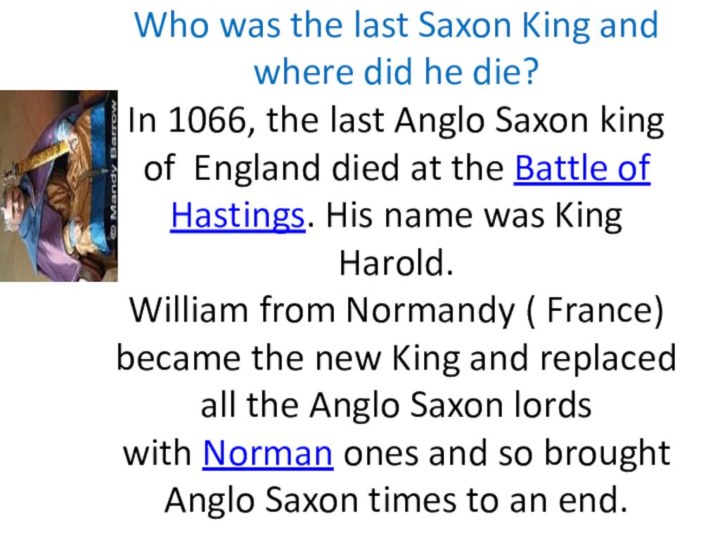
Слайд 6 It was during the second half of the
fifth century that more and more Anglo-Saxons arrived to
take land for themselves. It is for this reason that the time of the Anglo-Saxons is usually thought of as beginning about AD 450.Слайд 7 How long did the Saxons stay in England? They
ruled in England for about 500 years ( a hundred
years longer than the Romans). However, unlike the Romans, the Anglo-Saxons never 'went home'; many people living in Britain today have Anglo Saxon ancestors. The name England even comes from the Saxon word 'Angle-Land'.Слайд 8 Counties The Saxons settled in areas of Essex (East
Saxons), Sussex (South Saxons), Middlesex (Middle Saxons), and Wessex
(West Saxons). The Jutes settled mainly inKent. They did not call themselves 'the Jutes', they referred to them selves as 'the Kentings', that is the men living in Kent. The Angles settled in East Anglia
Слайд 9
Invasion and settlement
Peaceful settlement?
Some Anglo-Saxons came to
Britain to fight, but others came peacefully, to find
land to farm. The Anglo-Saxons knew Britain was a rich land. Their own lands often flooded, making it difficult to grow enough food. There was not enough land for everyone.Whole families set off across the North Sea in small boats. Each boatload of people formed a settlement with its own leader. They brought their tools, weapons, belongings and farm animals with them to Britain.
Слайд 10
Anglo-Saxon Society
• Warrior-based society, led by strong warrior
chief
• “Warfare was the order of the day”
(between clans, tribes, and outside invaders) • Anglo-Saxon life was dominated by the need to protect the clan and home from enemies.
• Fame and success were achieved through loyalty to a leader, and success was measured by gifts received from leaders.
Слайд 11
Anglo Saxon Houses
We know what Saxons houses may
have looked like from excavations of Anglo Saxon villages,
such as the one at West Stow in the east of England. Here, an early Anglo-Saxon village (c.420-650AD) has been carefully reconstructed where it was excavated. Using clues from the what was discovered, archeologists have reconstructed the houses as they may have looked about 1,500 years ago.We know that the Saxons built mainly in wood, although some of their stone churches remain.
Слайд 13
Anglo-Saxon life
Where did the Anglo-Saxons settle?
When the Anglo-Saxons
arrived in Britain, most kept clear of Roman towns. They
preferred to live in small villages. However, warrior chiefs knew that a walled city made a good fortress. So some Roman towns, like London, were never completely abandoned. Many Roman buildings did become ruins though, because no one bothered or knew how to repair them.Some Saxons built wooden houses inside the walls of Roman towns. Others cleared spaces in the forest to build villages and make new fields. Some settlements were very small, with just two or three families.
Слайд 14
Kings and laws
One king or many?
Each group of
Anglo-Saxon settlers had a leader or war-chief. A strong
leader became 'cyning' - Anglo-Saxon for 'king'. Each king ruled a kingdom and led a small army. There were many quarrels and wars between kings, to see who was the strongest.By around AD600 there were seven important Anglo-Saxon kingdoms. They were Northumbria, Mercia, Wessex, Sussex, Essex, Kent and East Anglia. From time to time, the strongest king would claim to be 'bretwalda' - which meant ruler of all Britain.
Слайд 16
Anglo-Saxons at war
How Anglo-Saxons fought
Anglo-Saxon armies were usually
small, with only a few hundred men. The soldiers
had spears, axes, swords and bows and arrows. They wore helmets on their heads and carried wooden shields. Everyone fought on foot during a battle. It must have been a bit like a giant rugby scrum, with lots of pushing and yelling, and nasty wounds.The most feared Anglo-Saxon weapon was a battle axe, but the most precious weapon was a sword. It took hours of work by a smith to craft a sword. He softened iron in a red-hot fire, twisted iron rods together and hammered the sword into shape.
Слайд 17
Alfred the Great
Why was Alfred so great?
Great Anglo-Saxon
kings included Offa of Mercia (who built Offa's Dyke)
and Edwin of Northumbria (who founded Edinburgh or 'Edwin's burh'). But the most famous of all is Alfred, the only king in British history to be called 'Great'.Alfred was born in AD849 and died in AD899. His father was king of Wessex, but Alfred became king of all England. He fought the Vikings, and then made peace so that English and Vikings settled down to live together. He encouraged people to learn and he tried to govern well and fairly.
Слайд 18
King Alfred the Great against the Danes
8th–9th centuries
Vikings, called Danes, invade Britain
871 Alfred of Wessex becomes
king of England.King Alfred unifies the Anglo-Saxons against the Danes. England becomes a nation.
Слайд 22
Stories and pastimes
Story-telling
Anglo-Saxons liked to gather in the
lord's great hall, to eat and drink, and to
listen to songs and stories. They loved tales about brave warriors and their adventures. A favourite story told how Beowulf, a heroic prince, kills the fierce man-eating monster Grendel, and Grendel's equally horrid mother. The story of Beowulf was first written down in the 8th-9th centuries, but long before that the story was told around the fire. The storyteller played music to accompany the songs and poems, on a small harp or on another stringed instrument called a lyre.
Слайд 23
The Anglo-Saxon bards
• called “scops” Anglo-Saxon harp
•
skilled storytellers and honored members of society.
• sang
of heroic deeds • regarded as equals to warriors• Anglo-Saxons did not believe in an afterlife
• warriors gained immortality through songs preserved in the collective memory
Слайд 24
Growing up
Girls
Anglo-Saxons thought sons and daughters were equally
important, but girls' work centred on the home. They
learned housekeeping skills such as weaving cloth, cooking, making cheese and brewing ale. Girls and boys collected sticks for firewood, and fetched water from a stream or well.Only a few girls learned to read and write. By the age of 10 a girl was considered grown-up. Most girls then married, though some became nuns in the Christian Church. A famous nun was Abbess Hild, born a Northumbrian princess, who founded Whitby Abbey (Northumbria) in AD657.
Слайд 25
Anglo-Saxon beliefs
Early Anglo-Saxon beliefs
In Roman Britain, many people
had been Christians. The early Anglo-Saxons were pagans. Much like
the Vikings of Scandinavia, they believed in many gods. The king of the Anglo-Saxon gods, for example, was Woden - a German version of the Scandinavian god Odin. From his name comes our day of the week Wednesday or 'Woden's day'. Other gods were Thunor, god of thunder; Frige, goddess of love; and Tiw, god of war.Anglo-Saxons were superstitious. They believed in lucky charms. They thought 'magic' rhymes, potions, stones or jewels would protect them from evil spirits or sickness.
Слайд 26 Where do the names of the days of
the week originate from?
Days of the Week
Certain days of
the week are named after early Saxon Gods.Monandæg ( Moon's day - the day of the moon ), Tiwesdæg ( Tiw's-day - the day of the Scandinavian sky god Tiw, Tiu or Tig), Wodnesdæg ( Woden's day - the day of the god Woden (Othin) ), Ðunresdæg ( Thor's Day - the day of the god Ðunor or Thunor ), Frigedæg ( Freyja's day - the day of the goddess Freyja or Frigg, wife to Woden), Sæternesdæg ( Saturn's day - the day of the Roman god Saturn, whose festival "Saturnalia," with its exchange of gifts, has been incorporated into our celebration of Christmas.), Sunnandæg ( Sun's day - the day of the sun ).
Слайд 27
What happened to them?
English and Vikings
The English often
called the Vikings "Danes" - though there were Swedish and
Norwegian Vikings as well as Danish ones. Anglo-Saxon history tells of many Viking raids, from the time in 793 when Vikings attacked the monastery at Lindisfarne in Northumbria and killed many of the monks.After King Alfred led the fight against them in the 870s, some Vikings settled down to live peacefully. They had their own part of eastern England called the Danelaw. English and Danelaw Vikings became neighbours, though other Vikings went on raiding from the sea.
Слайд 28
Why is Sutton Hoo famous?
Much of what we
know about the Anglo-Saxons comes from graves like the
one discovered at Sutton Hoo in Suffolk.Near the River Deben in Suffolk, at Sutton Hoo, are eleven mounds or 'barrows' dating back to the 7th century. In 1939 archaelogists explored the largest mound and discovered a ship buried in the mound.





